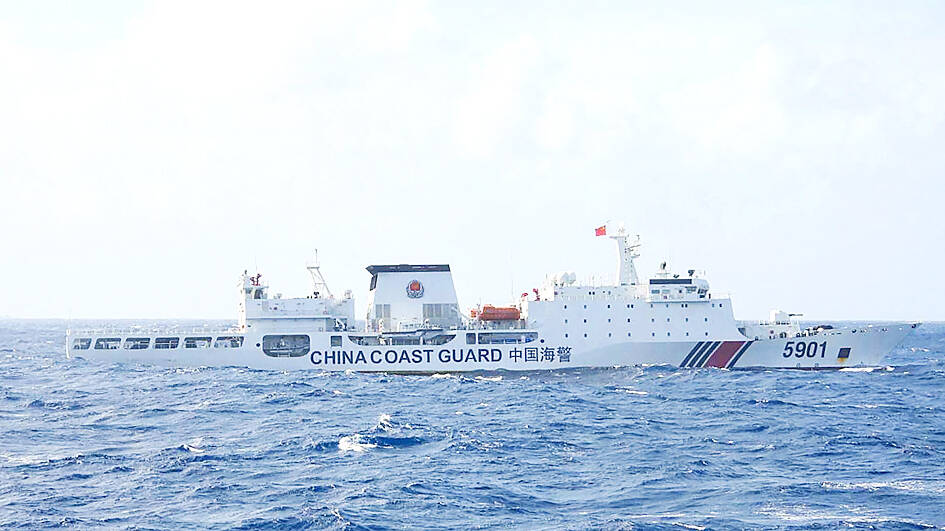Coast guard and fishery officials from the Philippines, the US, Vietnam and Indonesia practiced vessel boarding and arrest techniques at a joint maritime law enforcement training, the US embassy in Manila said yesterday.
The two-week course on the Philippines’ southern island of Mindanao comes as part of a regional effort to boost law enforcement cooperation as fears of maritime conflict with China grow. There have been frequent clashes or tense standoffs between Philippine and Chinese vessels in the strategic waterway, as well as recent incidents involving Vietnamese and Indonesian vessels.
“Together, we reaffirm our commitment to ensuring that our maritime sovereignty remains a zone of peace, safety and prosperity for all,” Philippine Coast Guard District Commander Rejard Marfe said in a statement released by the US embassy.

Photo: AFP
Marfe called the training that took place from Jan. 13 to Friday last week “invaluable in ensuring that we are better equipped to address maritime threats,” although the statement made no mention of China.
The training covered safe vessel boarding at sea, maritime law, evidence collection and preservation, safety and risk mitigation and arrest techniques, the statement said.
The Australian Border Force joined the coast guard, customs enforcers and fisheries surveillance officials at the training as observers.
China has stepped up expansion of its naval forces over the past few years as it seeks to extend its reach in the Pacific Ocean and challenge a US-led alliance.
Over the past few months, China has deployed navy and coast guard vessels to bar the Philippines from strategically important reefs and islands in the South China Sea.

INVESTIGATION: The case is the latest instance of a DPP figure being implicated in an espionage network accused of allegedly leaking information to Chinese intelligence Democratic Progressive Party (DPP) member Ho Jen-chieh (何仁傑) was detained and held incommunicado yesterday on suspicion of spying for China during his tenure as assistant to then-minister of foreign affairs Joseph Wu (吳釗燮). The Taipei District Prosecutors’ Office said Ho was implicated during its investigation into alleged spying activities by former Presidential Office consultant Wu Shang-yu (吳尚雨). Prosecutors said there is reason to believe Ho breached the National Security Act (國家安全法) by leaking classified Ministry of Foreign Affairs information to Chinese intelligence. Following interrogation, prosecutors petitioned the Taipei District Court to detain Ho, citing concerns over potential collusion or tampering of evidence. The

‘FORM OF PROTEST’: The German Institute Taipei said it was ‘shocked’ to see Nazi symbolism used in connection with political aims as it condemned the incident Sung Chien-liang (宋建樑), who led efforts to recall Democratic Progressive Party (DPP) Legislator Lee Kun-cheng (李坤城), was released on bail of NT$80,000 yesterday amid an outcry over a Nazi armband he wore to questioning the night before. Sung arrived at the New Taipei City District Prosecutors’ Office for questioning in a recall petition forgery case on Tuesday night wearing a red armband bearing a swastika, carrying a copy of Adolf Hitler’s Mein Kampf and giving a Nazi salute. Sung left the building at 1:15am without the armband and apparently covering the book with a coat. This is a serious international scandal and Chinese

Seventy percent of middle and elementary schools now conduct English classes entirely in English, the Ministry of Education said, as it encourages schools nationwide to adopt this practice Minister of Education (MOE) Cheng Ying-yao (鄭英耀) is scheduled to present a report on the government’s bilingual education policy to the Legislative Yuan’s Education and Culture Committee today. The report would outline strategies aimed at expanding access to education, reducing regional disparities and improving talent cultivation. Implementation of bilingual education policies has varied across local governments, occasionally drawing public criticism. For example, some schools have required teachers of non-English subjects to pass English proficiency

TRADE: The premier pledged safeguards on ‘Made in Taiwan’ labeling, anti-dumping measures and stricter export controls to strengthen its position in trade talks Products labeled “made in Taiwan” must be genuinely made in Taiwan, Premier Cho Jung-tai (卓榮泰) said yesterday, vowing to enforce strict safeguards against “origin laundering” and initiate anti-dumping investigations to prevent China dumping its products in Taiwan. Cho made the remarks in a discussion session with representatives from industries in Kaohsiung. In response to the US government’s recent announcement of “reciprocal” tariffs on its trading partners, President William Lai (賴清德) and Cho last week began a series of consultations with industry leaders nationwide to gather feedback and address concerns. Taiwanese and US officials held a videoconference on Friday evening to discuss the